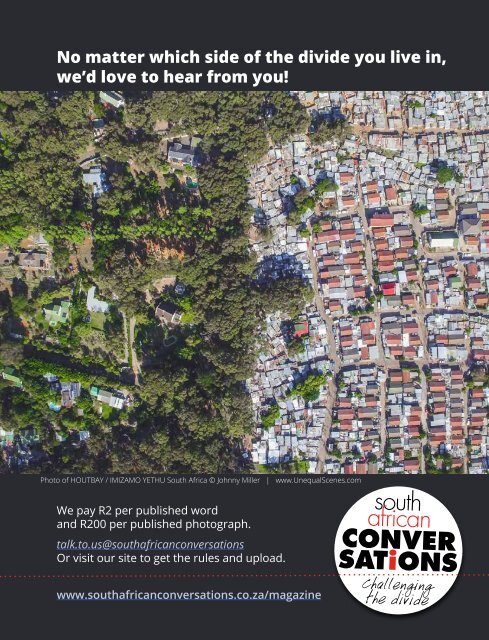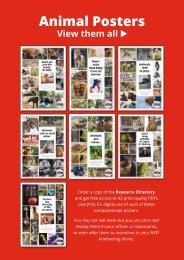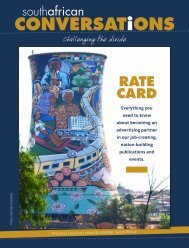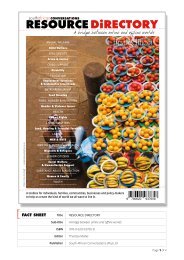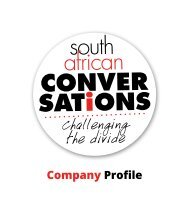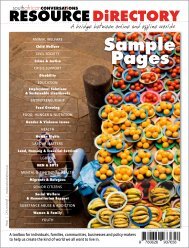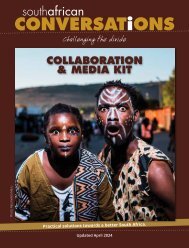South African Conversations sample articles
Insight into who we are as a people. Empowering, practical information. A platform for people who are otherwise voiceless. Suggestions for action by individuals, families, concerned onlookers, businesses and policy-makers to help create a better world for all of us. The South African Conversations magazine is a source of practical, solutions-oriented information. It empowers individuals, families and communities, raises awareness about the lived reality of people who are marginalised, and suggests options for action by concerned onlookers, businesses and policy-makers. The magazine is for sale exclusively by unemployed people who earn 50% of the cover price. Our distribution network is through NPOs across South Africa. These Distribution Hubs earn 17% of the cover price for supplying magazines to sellers and negotiating safe sales spaces for them in places with high levels of affluent foot traffic. Enjoy these sample articles and look for opportunities sprinkled throughout to collaborate with us.
Insight into who we are as a people. Empowering, practical information. A platform for people who are otherwise voiceless. Suggestions for action by individuals, families, concerned onlookers, businesses and policy-makers to help create a better world for all of us.
The South African Conversations magazine is a source of practical, solutions-oriented information. It empowers individuals, families and communities, raises awareness about the lived reality of people who are marginalised, and suggests options for action by concerned onlookers, businesses and policy-makers.
The magazine is for sale exclusively by unemployed people who earn 50% of the cover price. Our distribution network is through NPOs across South Africa. These Distribution Hubs earn 17% of the cover price for supplying magazines to sellers and negotiating safe sales spaces for them in places with high levels of affluent foot traffic.
Enjoy these sample articles and look for opportunities sprinkled throughout to collaborate with us.
Create successful ePaper yourself
Turn your PDF publications into a flip-book with our unique Google optimized e-Paper software.
southafrican CONVERSATiONS<br />
<strong>sample</strong> content<br />
21<br />
TRING-TRING-TRING ...<br />
ANSWER: Hello. This is<br />
Deidre.<br />
REPLY: Hello, how are you?<br />
ANSWER: (mildly irritated)<br />
Fine, thank you. Who are<br />
you?<br />
This is a relatively common<br />
exchange between black<br />
and white people in <strong>South</strong><br />
Africa.<br />
For many black people,<br />
the question ‘How are you?<br />
(Kunjani? / O kae?)’ is the<br />
only respectful way to start<br />
a conversation.<br />
This civility is inherent in<br />
most <strong>African</strong> languages<br />
and cultures. To start<br />
with the purpose of your<br />
call would be offensively<br />
impolite. For instance,<br />
one would not dream of<br />
simply saying ‘Dumela’.<br />
The greeting will always be<br />
followed by the question:<br />
‘O phela jwang?’ which<br />
literally means, ‘How is<br />
your life?’ — reminiscent<br />
of an era when people still<br />
had time to engage with<br />
one another.<br />
To the white person, the<br />
question feels like an<br />
intrusion: ‘You don’t know<br />
who I am and you haven’t<br />
even announced yourself,<br />
how can you ask me how<br />
I am?’ She wants to first<br />
know who you are and<br />
what the purpose of your<br />
call is, before engaging in<br />
small talk with you.<br />
When there is<br />
understanding it is<br />
possible to not only<br />
tolerate and accept our<br />
differences, but to respect<br />
the other’s behaviour.


